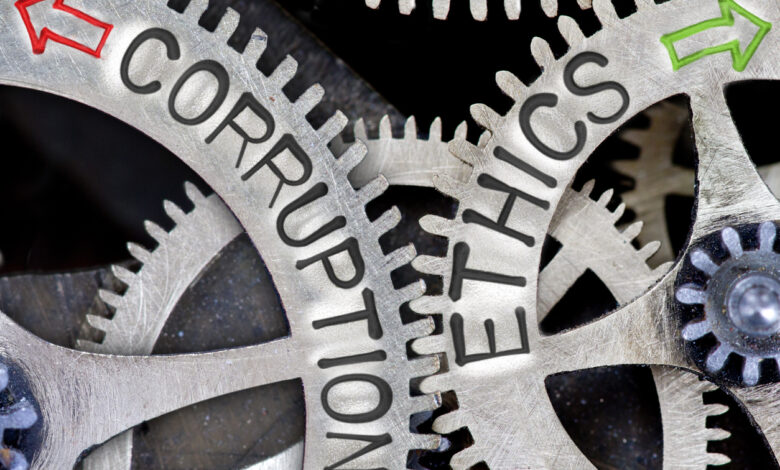Combating Corruption at Home and Abroad

President Biden is facing a series of challenges as he begins his second year in office. Russia is on the verge of further invading Ukraine, the Senate remains unwilling to pass the Build Back Better package or voting rights, and reports have surfaced today that Supreme Court Justice Stephen Breyer is planning on retiring, creating a vacancy on the Supreme Court for Biden to fill. Of course as these issues play out in Washington and Kyiv, larger issues like climate change and China continue to loom large. While there is no one-size-fits-all solution to these problems, the Biden administration may have an available solution that helps to frame these problems and offers a potential path to solutions: focusing on combating corruption.
President Biden has been talking about corruption consistently for years (for example see his work on Ukraine during his tenure as Vice President) but momentum has been building to make this a centerpiece of Biden’s agenda moving forward. In June, the President signed a memorandum making corruption a core U.S. national security interest. June also marked the launch of a bipartisan Congressional Caucus focused on combating kleptocracy. In December, the administration released the first ever United States Strategy on Countering Corruption which provided a roadmap for moving forward across a variety of different focus areas from building government capacity to track down and retrieve stolen money to increasing transparency in real estate. Congress, for its part, has also been working on these issues by including some anti-corruption legislation in the National Defense Authorization Act. While there is still much work to be done, with the direction laid out, the administration is poised to tackle some of the largest problems facing the country.
On the foreign policy front, Biden’s anti-corruption efforts could take the wind out of the sails of dictators and despots. Russia is reported to have almost one trillion dollars of dirty money circulating outside the country. With a Gross Domestic Product of only around one and a half trillion dollars, freezing and ultimately recovering this stolen money would be a huge blow to Putin and his cronies. That is to say, nothing of the impact to Putin’s image within Russia of parading his crimes in front of his people. Alexei Navalny, a Russian opposition leader, actually built his career around exposing corruption within Russia and just last week his organization exposed a trove of photographs of a secret palace owned by Putin. A combination of exposing the corruption, freezing kleptocrats out of the western legal and financial system, and recovering ill-gotten gains could prove very difficult for Russia to counter.
America’s competition with China could also be shaped by the fight against corruption. As Yuen Yuen Ang details in her book, “China’s Gilded Age: The Paradox of Economic Boom and Vast Corruption,” corruption runs rampant through the Chinese system. It has gotten so bad that the People’s Bank of China just launched a three year anti-money laundering campaign calling the money laundering situation in China “severe.” While the full extent of corruption in China is opaque, you can always hop on to Douyin, China’s version of TikTok, to see princlings flaunting their wealth. Or you could, before President Xi decided that this was a bad look for the party and began censoring these posts. China is not just content to keep its corruption at home but uses its Belt and Road initiative to export corruption through the 80 countries which it connects. President Biden’s efforts to work with partners around the globe to build capacity and strengthen anti-corruption laws would help curb China’s dark money influence wherever it may end up.
Cleaning up corruption may also help us clean up the environment and lessen the impacts of climate change. Jim Anderson, a lead governance specialist at the World Bank, writes that “[h]eadline-writers like to put dollar figures on the costs of corruption, but the real damage comes in the form of misdirected and poor-quality investments, including the outlays needed to mitigate the effects of a rising sea level and desertification.” This threat is multiplied by the fact that, as Zack Beauchamp of Vox noted in 2014, countries who have oil tend to be more corrupt. The fact that extractive industries are often in remote locations, far away from public security and governmental oversight, does not help either. On an international level, the lack of trust generated by countries’ inability to reign in corruption prevents greater coordination to tackle the impending climate crisis. Clearing up lines of beneficial ownership will turn opaque shell companies transparent and assist authorities track corruption from the oil field and coal mine directly back to the board room.
Domestically, combating corruption may seem to be ill-suited to fix the deep problems associated with polarization and stagnation in the government. However, Transparency International’s Corruption Perception Index has the United States at a historic low for the second year in a row. They say the score is driven by “the persistent attacks against free and fair elections, culminating in a violent assault on the US Capitol, and an increasingly opaque campaign finance system.” So, the President has some work to do.
As a good start, the President should voice his support of the recent efforts by Senator Jon Ossoff (D-GA) and Mark Kelly (D-AZ) to ban members of Congress and their spouses from trading individual stocks. During the early days of 2020, Kelly Loeffeler and Richard Burr received a closed door briefing about the extent of the pandemic and then rushed to change their financial holdings to benefit from this information. The eventual reporting of this brought this practice into the public spotlight once again. While Congress passed the Stock Act in 2012, its paltry fine of $200 and and its rampant disregard by members on both sides of the aisle prove that these rules alone are insufficient. Nancy Pelosi originally opposed this legislation but has recently come around on it, and with President Biden himself not trading individual stocks, this seems like a slam dunk. Biden could use this as an opportunity to harness the populist impulses of the country which led to the popularity of “drain the swamp” rhetoric from the right.
Perceived corruption at the Supreme Court is harder to handle. The recent decision on financial disclosures related to January 6th raised questions about the impartiality of Justice Thomas, given his wife’s political activism and comments about the events on January 6th. However, this is far from the only time that conflicts of interest have caused issues at the court. Three Supreme Court Justices own individual stocks and recuse themselves (though not always) when cases of those companies come to the court. Richard Painter, the chief White House ethics lawyer in the George W. Bush administration from 2005-2007, wrote in the National Journal that “The justices’ stock-based recusals cause problems at every step of the way.” Unfortunately, justices at the Supreme Court are not bound by ethics rules that are enforced against other federal judges. With Justice Breyer’s upcoming resignation, President Biden does not have an opportunity to change the balance of the court (as the balance would remain 6-3 conservative no matter who he selects) but he does have another opportunity. Chief Justice Roberts has spoken about the importance of judicial ethics and is incredibly interested in maintaining the institution of the Court. Biden should nominate someone to fill the Breyer spot who is focused on corruption issues and can work as a partner with Roberts to clean up the court. If this proves impossible or untenable, then Biden should work with Congress on crafting ethics rules for the Court despite the murky constitutional issues at play. The Court is important enough that it’s justices should be beyond even the perception of impropriety.
There is a significant amount of work to be done in the coming weeks and months for the Biden Administration and, unfortunately, there are no easy solutions. However, by focusing his efforts around combating corruption, President Biden can have a unifying message and policy toolkit which not only works to improve the functioning of America’s democracy but also takes on the toughest challenges facing the United States abroad.

